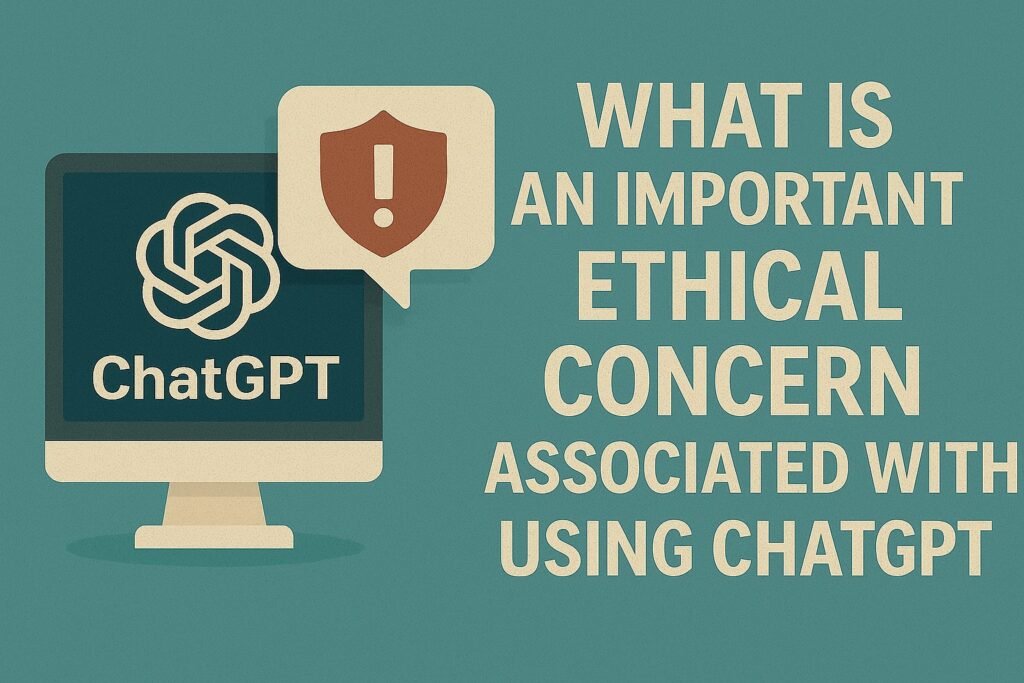One of the most pressing issues in today’s AI-driven world is understanding the ethical concern using ChatGPT responsibly. While AI offers groundbreaking capabilities, it also introduces complex ethical dilemmas—particularly around bias, misinformation, and privacy.
In this article, we’ll explore the most important ethical concerns associated with using ChatGPT and what users can do to address them.

What Is ChatGPT?
ChatGPT is a conversational AI developed by OpenAI. It can write content, answer questions, create summaries, and assist with coding or ideation. But like all AI tools, its use raises important ethical questions that go beyond functionality.
Most Important Ethical Concern Using ChatGPT
Bias and Misinformation
The most important ethical concern using ChatGPT is the risk of spreading bias and misinformation. Because ChatGPT is trained on vast datasets scraped from the internet, it may replicate or amplify existing societal biases, or provide inaccurate responses.
Why Bias and Misinformation Matter
Bias in AI can:
- Reinforce harmful stereotypes
- Misinform users, especially in sensitive areas like health, politics, or history
- Influence public opinion or decision-making with misleading data
Even when ChatGPT doesn’t intend harm, its responses can reflect the biases embedded in the training data.
Other Ethical Concerns to Consider
1. Privacy Risks
Users may inadvertently input sensitive information. While ChatGPT doesn’t “remember” personal data across sessions, any shared data is still processed by AI systems.
2. Plagiarism and Content Ownership
AI-generated content can resemble existing work, leading to concerns around authorship, originality, and intellectual property.
3. Over-Reliance on AI
Dependence on ChatGPT for decision-making—especially in education or healthcare—can reduce critical thinking and risk replacing expert judgment.
How to Address These Ethical Concerns
1. Always Fact-Check Responses
Use trusted sources such as:
- NIH.gov for health
- Justice.gov for legal context
- ED.gov for education
Never rely solely on ChatGPT for high-stakes decisions.
2. Use Inclusive Language and Prompts
Be intentional with your language to reduce bias. Avoid prompts that stereotype or generalize based on gender, race, or religion.
Prompt Example:
Instead of: “Describe a typical nurse.”
Use: “Describe the key skills needed for a nurse in a hospital setting.”
3. Don’t Share Sensitive Information
Avoid typing:
- Social security numbers
- Medical records
- Proprietary business data
🔗 Related: [Limitations of ChatGPT: How Users Should Respond]
4. Treat AI as a Tool, Not a Replacement
Use ChatGPT to:
- Assist, not replace, research
- Draft, not finalize, content
- Support, not substitute, expert opinion
The Role of Developers and Platforms
While users play a big role, ethical AI use also depends on:
- Transparent development: Clear communication about limitations
- Bias mitigation: Regular updates to minimize skewed responses
- Accountability: Mechanisms to report and address harmful outputs
OpenAI and other developers are actively working to address these issues—but user responsibility remains critical.
Conclusion
Understanding the ethical concern using ChatGPT is essential for safe and effective AI use. Bias and misinformation are not just technical glitches—they can have real-world consequences. By using AI responsibly, fact-checking outputs, and maintaining privacy standards, users can contribute to a more ethical and informed digital ecosystem.
ChatGPT is a powerful tool—but only when used with caution, clarity, and conscience.
FAQ: Ethical Concern Using ChatGPT
What is the main ethical concern with ChatGPT?
The most significant ethical concern is its potential to produce biased or misleading content due to the nature of its training data.
Can ChatGPT be used responsibly?
Yes. With proper fact-checking, thoughtful prompts, and awareness of its limitations, ChatGPT can be a highly effective and ethical tool.
Is ChatGPT safe for sensitive topics?
Not entirely. Users should avoid relying on ChatGPT for legal, medical, or financial advice without expert verification.


Leave a Reply